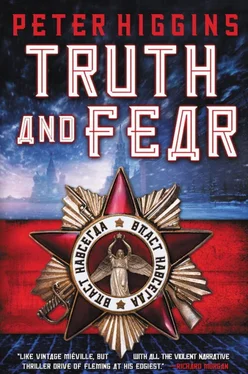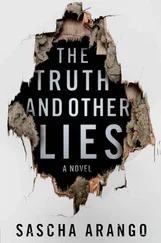He came to a place where a stick of bombs had gouged wide shallow craters in the street. The scent of upturned earth and exposed roots. A broken watermain welled up and made the street a shallow, muddy river flowing between houses with shattered roofs and fallen walls. A dead horse lay on the churn of earth and snow in the cooled spillage of its own entrails. Bez sensed a life nearby. A human sound. Spidering up the slope of a collapsed brick wall, he looked over the edge into an open cellar. A mother was crouched in the rubble over her dead children. Bez called to her. The face she lifted towards him was smeared with grey dust. It was too dark for her human eyes to find him. He could see them, wide and staring in the darkness. He dropped down into the cellar and stroked her dust-caked hair as he pulled out her throat.
Wolftaint was stronger now. Close by. Bez climbed to the roofs to make a cautious, circular approach. The human death, his first kill of the night, had calmed him, as it always did. Taken the edge off his need. He had abandoned the idea that wolf was leading him to the Shaumian woman. Wolf was stupider than he had thought and now he was simply prey. Take him quickly, then go to the Apraksin and pick up a trace from there. It was only a few minutes after midnight–hours yet till the sun.
Bez crested the ridge of a tenement roof and saw him. He was standing in the middle of a cobbled square in the form of a man, his back turned to where Bez was. Wolf seemed at a loss. Waiting. Wolf spoor streamed from him onto the air, bright unmistakable scented clouds. Bez settled in the lee of a chimney to watch. Wolf was doing nothing. Just standing out in the middle of the square. And then Bez realised his mistake. He’d been careless. Overconfident. This night he wasn’t hunter, he was hunted. Wolf had led him out here into the waste places of the city, away from the Shaumian woman, and was calling him, baiting him with the trap of himself. Come down. Come down.
Bez grinned in the darkness as he slipped away.
Maroussia was awake in the night. She lay still, breathing slowly. Listening. The attic window framed a flickering sky: gunfire on the distant horizon, flashing against low-hanging cloud. A new kind of weather.
Lom lay next to her, warm and heavy under the quilt, eyes clenched fiercely in sleep.
There were trees in the room. The room was full of trees.
Count Palffy’s house was full of trees.
The streets of the raion were full of trees.
Watchful trees, waiting for her.
Maroussia turned back the quilt and crawled out of the bed. Her dress was draped over a chair. From the pocket she brought out the bag, stained with her mother’s blood, that held the thing of twigs and tiny bones. She opened the bag and took it out. It stirred in the cup of her palm restlessly, as if a small animal was in there, moving. There were tiny berries inside it, fresh and purple-bright. She leaned forward and brought it up to her face. Listening. Quiet voices whispered. Calling her.
Come out. Come out under the trees.
She pulled her coat on over her night shirt and, holding the knot of twigs and forest breath cupped gingerly in her palm, went down into the house and made her way through tree-crowded landings and passage ways out into the street. Bare feet in the snow. The moons spilled white luminance through gaps in the cloud. The vapour ghosts of her breath glittered. It was so cold. Bitter cold.
There wasn’t much left of the streets; it was mostly trees. She walked among them, her feet freezing, pushing onwards, deeper and deeper into the trees. Eventually she remembered the bag in her hand and stopped. Undid the string at the bag’s tight mouth and pulled it open.
Between step and step she passed through into difference. Forest. Change.
Maroussia was in a beautiful, simple place under the trees. Everything rang with a true, clear note, and everything shone out from within itself with its own radiance, fresh and cool. Nothing was anything except what it was. The distances between things were airier and more obvious. The night air–luminous velvet and purple-blue–streamed with perfume. Corn-gold swollen stars spilled flakes of light that brushed her face and settled on her shoulders.
Walking, she left a trail of dark impressions across dew-webbed grass. She came to a wide clump of thorn. Tiny droplets of mist-water, star-glittering, hung from every tip and nestled in the crooks and elbows of every twig. The water made her thirsty. She crouched in the long wet grass and licked at the branches, making slow careful movements with her tongue. She took hawthorn twigs into her mouth carefully. The water was cold and good. The wood tasted… complex. Thorns pricked the inside of her mouth, mingling the iron taste of her blood with the wood and the water.
She looked at her own hands. They were made of leaves.
The world cracked open as if gods were walking through it. It was a breaking of tension, like a shattering downpour of rain. Everything was alive with wildness. Maroussia herself was spilling streams of perfume and darkshine from her mouth and skin and hair: bright stain-clouds on the air, carrying far and broadcasting promises of plenty.
Bez Nichevoi watched the Shaumian woman from his place on the roof of the house. She was walking slowly, barefoot in the snow, bare-headed, straight-backed and thin. Her dark woollen coat hung open, unbuttoned over a white cotton nightdress, spilling the smell of her body still warm from her bed. Between the collar of her coat and the tangle of her short black hair, the nape of her neck showed slender and pale. Bez groaned quietly. Desire was a constriction in his throat, a dark knot in his belly, a rigid knife rising from his groin. He wanted to feed on her slowly, and… do… such pleasurable things…
He followed her for a while. Unhurried. Letting the moment last. Taking pleasure in anticipation and delay. He worked his way round in front of her and came down into the street.
Her eyes passed over him and did not see. Her gaze was turned inward. He stood and let her come to him. The dark buildings of the raion faded for him too. It was as if he was standing under trees: shadows, the wind among branches, the slip of tiny snowfalls from twigs and needles, the smell of ice and resin and cold earth.
And then she knew he was there.
Her dark eyes widened and stared into his. She opened her mouth: a ragged indrawn breath. He saw the gleam of her teeth. The moistened heat of her tongue.
He immobilised her quickly and slung her across his shoulders. She was surprisingly heavy. He began to run.
Athousand miles north and east of Mirgorod, at six in the morning Vayarmalond Eastern Time, Professor Yakov Khyrbysk hurried across the floor of an underground cavern deep inside a mountain. The cavern was as wide as a football field and bright as day: a hundred brilliant fluorescent tubes burned overhead in the ceiling of raw black rock. Their light splashed off the concrete floor, a grey-white dazzle. The cavern was empty except for one flat-roofed building, little more than a large shed, sitting right out in the centre of the echoing space: a crude temporary construction of boards screwed to a steel frame, a cubic carton with sixty-foot edges. Thick rubber-sleeved cables trailed hundreds of feet across the ground towards it. Around the shed the concrete floor was smudged and dirtied with feathered spills of black, as if dark ashes had been scattered there.
Khyrbysk pushed open the door and entered. A dozen men and women were working inside, standing at workbenches. Control panel arrays. Dials and gauges. They all looked up when he came in. They had the pale drawn faces of people who have been working all night. Spotlights on tripods cast harsh shadows.
Читать дальше


![Кэмерон Доки - Правда и ее последствия[Truth and Consequences]](/books/79610/kemeron-doki-pravda-i-ee-posledstviya-truth-and-con-thumb.webp)









